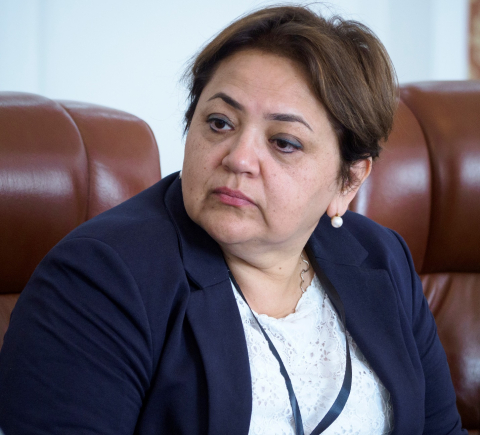Freedom from Torture
Civil Society Coalition against Torture and impunity in Tajikistan

"We have very good legislation, one of the most progressive in terms of guaranteeing human rights in the criminal justice system. And what happens in practice?" Gulchehra Kholmatova, Head of the Public Organization "The World of Law" and Head of the Legal Assistance Group of the Civil Society Coalition against Torture and Impunity in Tajikistan raised a question during her speech at the conference "Combating Torture: Experience and Achievements" held on October 25 in Dushanbe.
According to her, all of these conclusions are based on an analysis of the activities of Coalition's Legal Assistance Group, which is led by her, as well as her legal practice.
"The biggest problem for us is the persistent lack of effective and timely investigation of torture complaints. In our view, the increase in appeals to public organizations for legal assistance is due to the fact that citizens are not always satisfied with the results of their appeals to law enforcement agencies," mentioned human rights defender.
According to her, experience shows that not all complaints of torture and ill-treatment are brought to trial, and there are many causes behind this. "A lack of evidence base, independent forensic medical experts, refusal of victims for further appeal due to frustration, stress, pressure, lack of financial and time resources to 'pester' competent authorities, lack of legal knowledge, and esprit de corps (mutual cover-up) among some law enforcement agencies in certain districts and much more," she listed.
According to her, victims of torture and ill-treatment often refuse to further appeal against the actions of the investigating authorities, which consequently leads to impunity for the "torturers". The first factor is the length and complexity of the application consideration process. Many victims get tired of endless wandering through the various authorities. Furthermore, the persecution and intimidation of victims, their lawyers, and families by law enforcement officers who are accused of torture. This is a significant obstacle, as there are currently no effective safeguards to protect complainants and witnesses from persecution, despite a special law.
Another factor is the fear of torture victims, who, being afraid of retaliation by alleged "torturers," are unwilling to support further appeals.
"Criminal cases are closed, and the perpetrators go unpunished," stressed Gulchehra Kholmatova.
According to her, the Criminal Code prohibits subjecting participants of criminal proceedings to violence, torture, and ill-treatment. Article 88 of the CCP states that evidence obtained in the course of the interrogation through torture is considered invalid and cannot be grounds for the charge. "However, when the defendant claims torture and ill-treatment by law enforcement agencies during the trial, the courts ignore these claims and limit themselves to summoning and examining the investigators and operatives of the internal affairs agencies," she mentioned. The peculiarity of law enforcement practice concerning complaints of torture is that it is practically impossible to obtain a formal investigation at the national level. Complaints of torture are registered by the investigative bodies of the prosecutor's office and are verified following the rules of the Code of Criminal Procedure of the country. In most cases, even though the incident had occurred, the fixed bodily injuries , and the testimony of witnesses are present, a resolution is issued to refuse to initiate criminal proceedings.
The conference was organized by the Civil Society Coalition against Torture and Impunity in Tajikistan together with the Prosecutor General's Office of the Republic of Tajikistan with the assistance of the OSCE Program Office in Dushanbe, International Commission of Jurists and Sigrid Rausing Trust.
The main purpose of the conference was to discuss pressing issues in the area of combating torture and ill-treatment in Tajikistan.
The conference was attended by international experts, representatives of state bodies, law enforcement agencies, courts, the prosecutor's office, the Office of the Commissioner for Human Rights in Tajikistan, international organizations and embassies, as well as public organizations, members of the Civil Society Coalition against Torture and Impunity in Tajikistan, and the mass media.